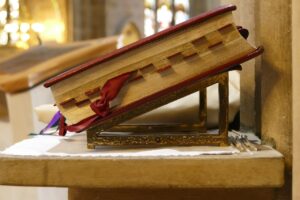Isaiah 11:1-10; Psalm 72; Romans 15:4-9 (RM) or 4-13 (RCL); Matthew 3:1-12.
If I were standing in front of you preaching (and not tapping away on a computer keyboard) I’d look out at the congregation with a big mischievous grin and say:
“If you remember this, sing along:
Pre–e–e–pare ye the way of our God.
Pre–e–e–pare ye
the way
of
our
God.
…which of course is the opening solo clarion call from the 1971 musical Godspell (OK, with a tiny tweak to the words.)
We’d sing it through several times with gusto, and I’d promise you that you’d feel completely energized and just so good afterward, you could tackle anything.
The figure of John the Baptist is introduced in Matthew’s gospel account and used as the Gospel for the Second Sunday of Advent. It’s easy to remember John by the distinctive characteristics (not to say clichés) in Matthew’s description: wore ratty animal skins, ate bugs, tore a strip off the local religious authorities for their hypocrisy. What you might not see is that Matthew cast John as a latter-day Elijah.
The author of Matthew was a Jewish Christian whose first language was Greek, and may have known Aramaic, Jesus’ native tongue. He would not only have been steeped in Hebrew Scriptures and stories, but acutely aware that there was no widespread conversion to belief in Jesus among the now-scattered and defeated Jewish population. He must have counted his mission as a failure.
The prophet Elijah was believed to have ascended to heaven toward the East, on a chariot (so he never died.) And as the story goes, Elijah would come again, which is why today, during the Passover Seder, little kids might be told “Listen! Did you hear knocking at the door? Maybe it’s Elijah! Run out and see if Elijah is here!” And a place at the table is set for Elijah, just in case.
By the way, what John wore was probably actually soft furry camel’s hair.
There are two other aspects of this story that give it a rather different colouration than you may have heard. One has to do with what this latter-day Elijah came preaching: repentance. Up until the 16th century this word was translated as “penance,” as in, “do penance for your sins.” Well, it seemed to fit well enough. But when the great humanist scholar Erasmus translated the New Testament he used, for the Hebrew word shubh, “metanoia” in Greek: conversion, a change of mind, literally a turnabout. In turn this shift in meaning influenced Martin Luther’s thinking. When you think about it, the dignity of the individual responding to the call is much better affirmed by this invitation: not to punish oneself enough to get ahead of God’s punishment for sin, but simply to change one’s mind. Turn one’s life around. (Not that this is simple, by any means.)
The other little quirk has to do with where you put the comma in the line about the wilderness. Does it mean something different if you say, “A voice of one crying out in the wilderness, ‘Prepare the way of God!’” or “A voice of one crying out, ‘In the wilderness prepare the way of God!’” It should, because the latter is more accurate to the Hebrew (in Isaiah), “Make straight in the desert a highway for our God.” It’s not about the voice shouting from the wilderness, but the road to be built. Compare the Gospel of Mark, “Make straight in the wilderness a highway for our God.”
There’s a saying in the Black church, “God makes a way out of no way.”
Now, take a deep breath, and sing “Pre-e-e-pare ye…” a couple more times.
Yes, out loud. Really loud.
Then take that positive energy and use it to make a way where there is no way.
© Susan K. Roll
Susan Roll retired from the Faculty of Theology at Saint Paul University, Ottawa, in 2018, where she served as Director of the Sophia Research Centre. Her research and publications are centred in the fields of liturgy, sacraments, and feminist theology. She holds a Ph.D. from the Catholic University of Leuven (Louvain), Belgium, and has been involved with international academic societies in liturgy and theology, as well as university chaplaincy, Indigenous ministry and church reform projects.





Realizing the reading is “not about the voice shouting from the wilderness, but the road to be built” brings a further urgency to the reading. And “making a way where there is no way” calls for a deeper creativity and courage.